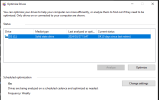We installed a new Windows server 2022 on a cluster that uses an SSD-based ceph volume. All seems to be going well, when suddenly windows event log reports:
"An error was detected on device \Device\Harddisk0\DR0 during a paging operation"
It's Windows error # 51
There are other Windows servers (but older 2016 versions) running on the cluster without a single report of this happening. They're also using the same ceph cluster.
The machine is configurated with scsi-virtio single and the driver are installed, as well as the KVM-guest-agent.
Could this be a peculiarity with Window Server 2022? Any other ideas on why this would be happening?
PS. I checked the https://pve.proxmox.com/wiki/Windows_2022_guest_best_practices page and updated the Virtio driver to the latest version now, which might have been the cause. I was on 0.1.229 and now have 0.1.240. I'll update if that solved this.
"An error was detected on device \Device\Harddisk0\DR0 during a paging operation"
It's Windows error # 51
There are other Windows servers (but older 2016 versions) running on the cluster without a single report of this happening. They're also using the same ceph cluster.
The machine is configurated with scsi-virtio single and the driver are installed, as well as the KVM-guest-agent.
Could this be a peculiarity with Window Server 2022? Any other ideas on why this would be happening?
PS. I checked the https://pve.proxmox.com/wiki/Windows_2022_guest_best_practices page and updated the Virtio driver to the latest version now, which might have been the cause. I was on 0.1.229 and now have 0.1.240. I'll update if that solved this.
Last edited:


